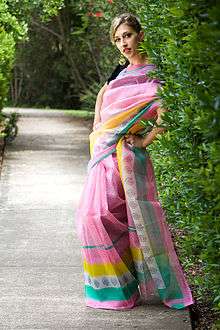Kota Doria
Kota doria or Kota doriya or 120i is one of many types of sari garments[1] made at Kota, Rajasthan and Muhammadabad Gohna, Mau in Uttar Pradesh and its nearby area. Sarees are made of pure cotton and silk and have square like patterns known as khats on them.[2] The chequered weave of a Kota sari is very popular.[3][4] They are very fine weaves and weigh very less.
History
Originally, such sarees were called Masuria because they were woven in Mysore. The weavers were subsequently brought to Shada, a small town in Kota by Rao Kishore Singh, a general in the Mughal army. The weavers were brought to Kota in the late 17th and early 18th century and the sarees came to be known as 'Kota-Masuria'.
Weave
Kota Doria is woven on a traditional pit loom in such a fashion that it produces square checks pattern on the fabric. The delicately wrought checks are locally known as khats. They smear onion juice and rice paste with a lot of care into the yarn making the yarn so strong that no additional finishing is needed.

Industry
Kota sarees are popularly known as 'Masuria' in Kota and Kotadoria outside the state. 'Doria' means thread. Rajasthan Handloom Development Corporation (RHDC) is taking the lead in producing items other than sarees from the Kota Doria. They have helped produce lamp shades, curtains, skirts and salwar-kamiz. They have even helped make an all silk saree on Masuria handlooms. Kota saris display individuality with a bit of embroidery and border patches, making them totally exclusive.
References
- ↑ Taplin, Ruth (2010-08-20). Intellectual property, innovation and management in emerging economies. p. 110. ISBN 9780203844403.
- ↑ "Different types of Sarees from North India, South India and East India.". www.indiamarks.com. Archived from the original on April 17, 2012.
|first1=missing|last1=in Authors list (help) - ↑ Ritu Jain and Victoria Singh. "Kota doria - unique summer weave". Kota Heritage Society. Retrieved 2016-04-20.
- ↑ Vidya Prabhu. "Translated from Kalamkari". The Indian Express. Retrieved 21 May 2015.